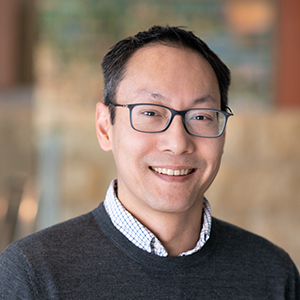The research community at the Institute includes visiting scholars, consultants, economists, research analysts, and research assistants. These scholars bring a diversity of backgrounds, interests, and expertise to research that deepens our understanding of economic opportunity and inclusion as well as policies that work to improve both. We talked with four of them about their work.
In college, Kuma Okoro had a professor who frequently argued that the federal poverty line, despite its name, is actually a pretty lousy measure of poverty.
That’s because it’s based primarily on the cost of food, which was among the largest expenditures for impoverished families in the 1960s when the measure was developed, but is much smaller today.
The idea that there isn’t one measure of poverty really stuck with him, said Okoro, who’s now a research assistant with the Institute.
“That influences my thinking about the work that we’re doing,” he said. “What aspect [of poverty] is this capturing? What aspect is this leaving out?”
Okoro, the biracial son of a Nigerian immigrant and a rural Iowan, grew up in the Milwaukee area, one of the most segregated metropolitan areas in the country. People living blocks apart could have entirely different life trajectories, he said, and that raised a lot of questions for him.
So when Okoro entered Georgetown University, he found himself drawn to classes that examined poverty and inequality. “As I was moving through my degree, those were really the classes that I found the most interesting and the most exciting and the most relevant to the real world,” he said.
As an intern working on transportation policies for the Federal City Council, a community advocacy group in Washington, D.C., Okoro had a chance to work on such real-world equity issues. For example, the area’s subway gets a lot of attention from policymakers who are familiar with it, but his group pushed for more funding for buses because fares are much lower and low-income families depend on them.
Since joining the Institute in September 2020, Okoro has continued to work on issues of economic opportunity and inclusion. For a recent project with visiting scholar Krista Ruffini, a leading expert on food security policies, Okoro assembled a map showing the dates state governments planned to distribute the pandemic electronic benefit transfer, a nutrition assistance program meant to replace free school lunches for children attending school remotely.
The program has proven to reduce hunger, yet many states delayed distributing the benefits—some until the end of the school year—due to bureaucratic and logistical challenges. It impressed him, Okoro said, that the Minneapolis Fed would have an institute devoted to identifying and seeking solutions to such issues.
This article is featured in the Fall 2021 issue of For All, the magazine of the Opportunity & Inclusive Growth Institute
More Scholar Spotlights from this issue
Tu-Uyen Tran is the senior writer in the Minneapolis Fed’s Public Affairs department. He specializes in deeply reported, data-driven articles. Before joining the Bank in 2018, Tu-Uyen was an editor and reporter in Fargo, Grand Forks, and Seattle.







